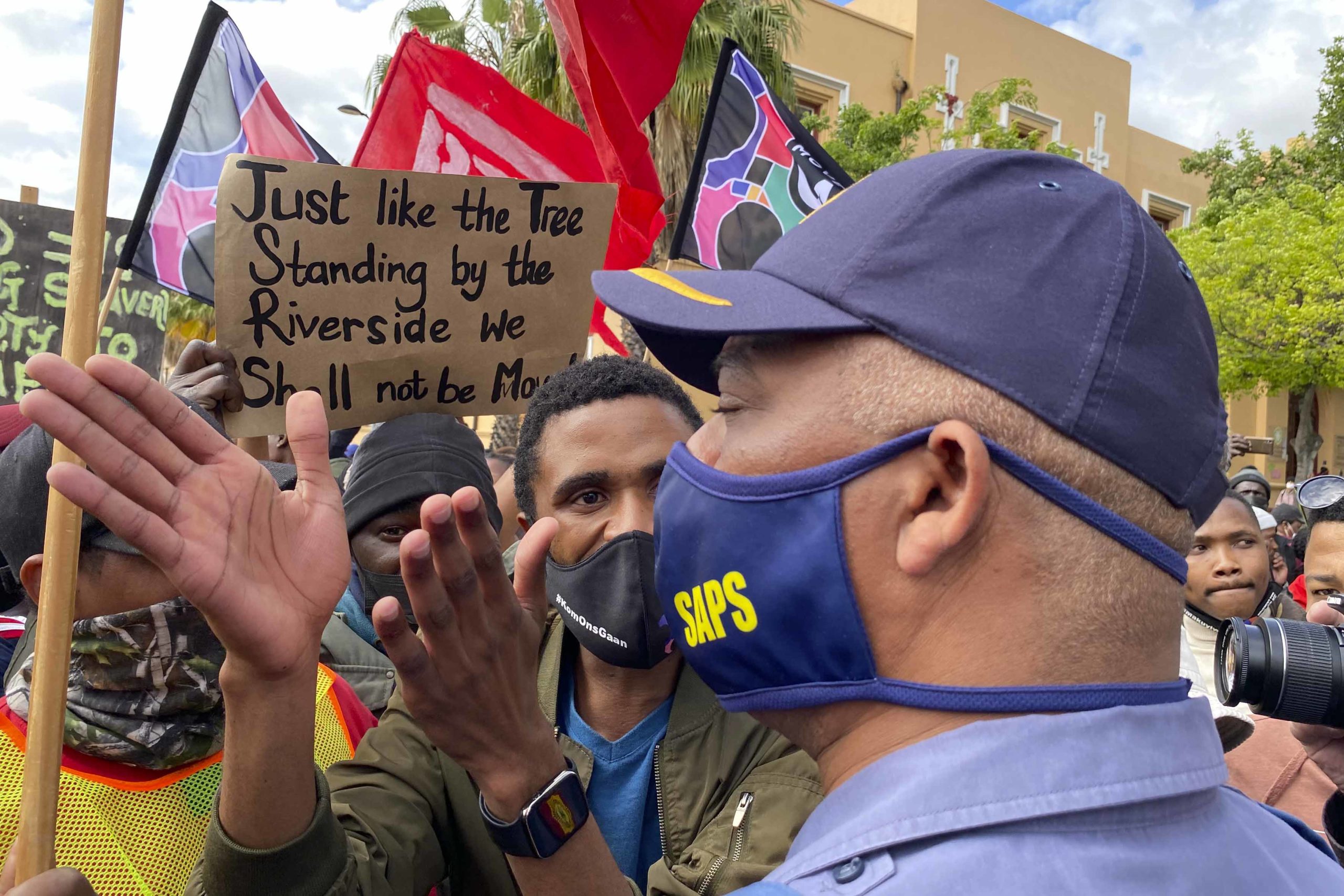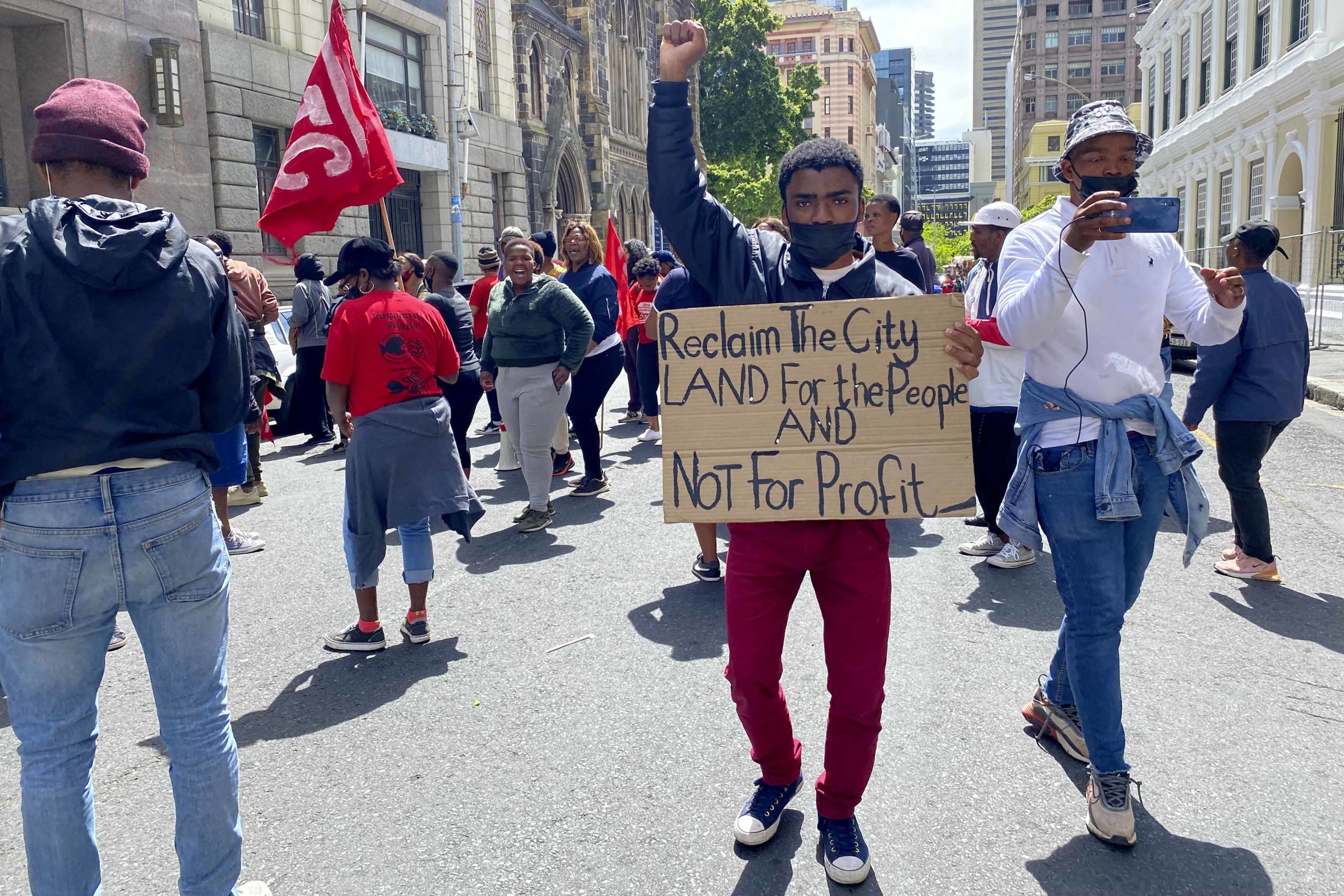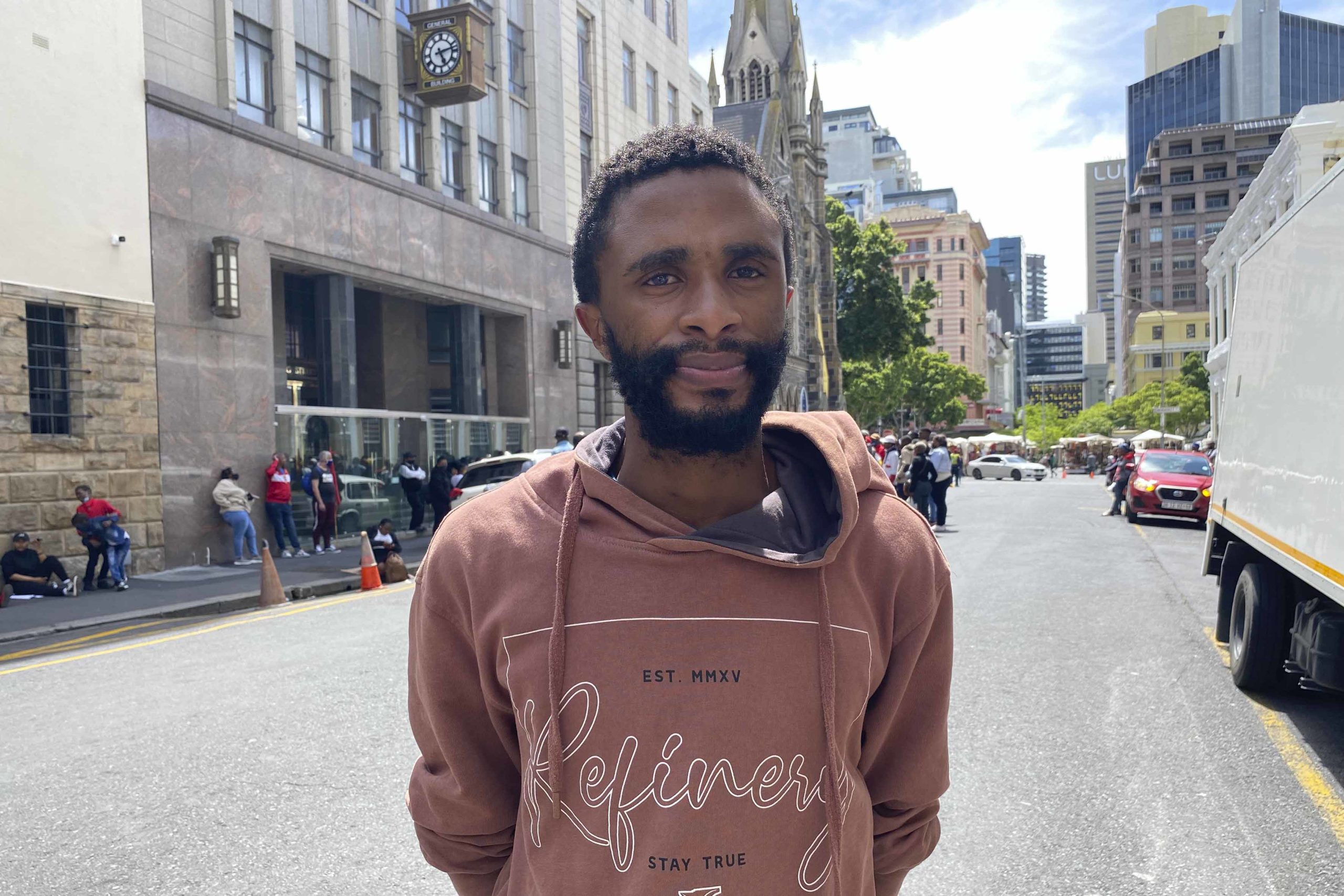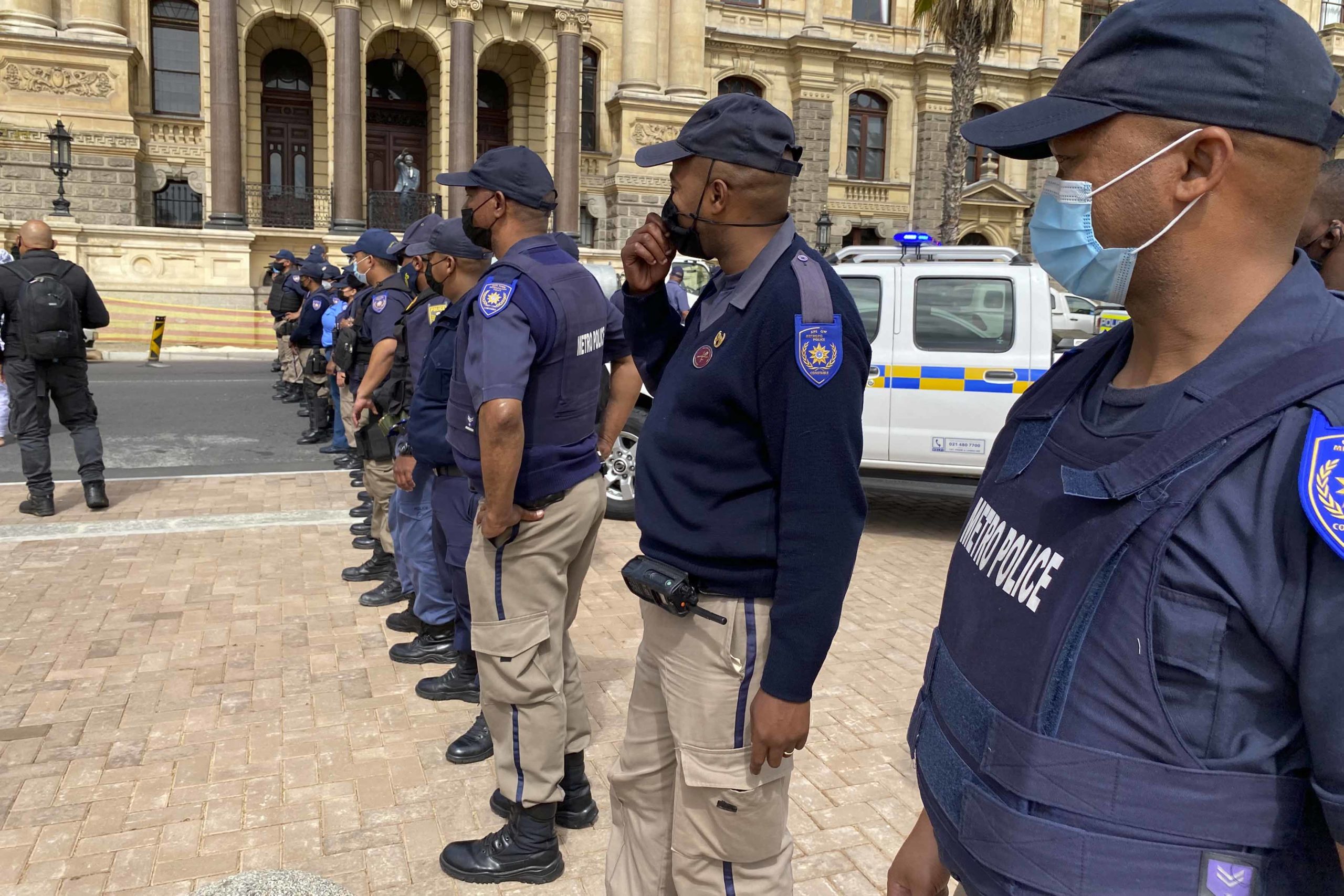Housing activists’ peaceful march ends in pain
Police in the Western Cape used stun grenades against marchers protesting against Cape Town’s new by-laws which also followed a raid at Cissie Gool House on the same day.
Author:
21 October 2021

The police responded with violence to a peaceful protest against the City of Cape Town’s new by-laws on Friday 15 October. Young and elderly people were among the more than 50 activists who marched to the DA’s office in Cape Town. At least one elderly man had to be taken to hospital as a result of the violent reaction, which included the use of stun grenades.
The new by-law on unlawful occupation and the amended by-law on streets, public places and prevention of noise nuisances, both of which have been labelled as being anti-poor, were passed by the city council in September despite more than 8 000 objections from the public.
The elderly man has since been discharged from hospital, but activists are concerned that this is just the start of a new wave of violence against impoverished and vulnerable people.
The march also followed a Friday morning raid by law enforcement at the defunct Woodstock hospital, renamed Cissie Gool House by residents, which is being occupied to protest against the lack of affordable housing.

Buhle Booi, the head of political organising at Ndifuna Ukwazi, an activist organisation and law centre, said about 300 officers undertook the raid without producing a search warrant. As a result, members of social movements gathered to march from Woodstock down to the DA’s offices in the city, where they were met with massive police resistance. The march against the by-laws had been planned prior to the raid.
“We tried to engage and reason with the police,” said Booi. “We told them our demands and that there was no permit that was required. They didn’t even give a warning to people. That is not a way for the police to be conducting themselves. They are supposed to be upholding the law, but they are contravening the laws that are governing this country.”
According to Western Cape police spokesperson Joseph Swartbooi, the group of protesters marched down Darling Street in the direction of the “housing offices” in the city centre. The protesters “ignored an instruction to disperse, after which police members used stun grenades to disperse the group”.
Swartbooi also said the police had a search warrant for Cissie Gool House. “The members confiscated a .38 special revolver in a drawer, which was later discovered to be stolen in Potchefstroom.” He also said they found large amounts of drugs during the raid, but no arrests were made.
Booi, in turn, said the marchers would lay charges of violence against the police.
What’s in a home?
The activist strongly believes the city is trying to circumvent the Prevention of Illegal Eviction Act and Unlawful Occupation of Land Act with the new by-laws. “That’s what we are fundamentally opposed to. The by-laws are reminiscent of apartheid policies,” he said.
“These by-laws give excessive powers to law enforcement officials to determine what constitutes a home. How dare the City tell people what constitutes a home? There are no guidelines. They must tell us if there must be a flatscreen TV in order for it to be considered a home. They will demolish your home. Shacks are homes to us. Wherever we stay, even tents are home to us. Any shelter we consider home.”
A joint media statement by social movements including Reclaim the City, Singabalapha, the Movement For Care, Rehoming Collective and Housing Assembly, read: “We demand that the city disposes of these by-laws. These by-laws criminalise people who live on the streets, people who have been forced to occupy land because there is a lack of affordable housing, and people living in informal settlements across Cape Town.

“It is important to note that these by-laws have been approved against the backdrop of extreme need. The City currently sits on a housing backlog of almost 370 000 families. The lack of political will to address generations of dispossession, coupled with systematic failure on the part of all levels of government to deliver on the promise of a government-subsidised housing programme, have all contributed to the housing crisis.”
The lack of adequate housing has been one of the main talking points of political parties in the build-up to the local government elections taking place on 1 November. Booi said the activists had hoped to discuss the issue with the DA’s mayoral candidate, Geordin Hill-Lewis.
“They [the police] tried to disrupt us, but we are here. We are here to engage with the DA. We wanted to say if you come into office, come and engage with us. If you are to be the mayor of people, come and engage with the people. What are his intentions given that there are over 8 000 people who submitted objections to these by-laws?”
Opposing the hatred
Booi added that residents without proper housing and different organisations worked together to oppose the by-laws. “These stand to impact us negatively as people in occupations and informal settlements and rentals in general. People came together to plan how to challenge these by-laws,” Booi said.
“We are in the middle of a housing crisis in Cape Town. What you see here is that money, instead of going to housing and the needs of our people, goes to policing and law enforcement. If you look at the budget the housing department and law enforcement gets, it is similar. The City invests in keeping people out and criminalising people instead of providing basic services,” said Booi, who believes the “hatred towards the homeless and marginalised” needs to be challenged politically.
In a statement on the by-laws issued last month, the City said there were large gaps in the Prevention of Illegal Eviction from and Unlawful Occupation of Land Act owing to the national government’s failure to pass regulations to support the legislation.
“The [unlawful occupation] by-law further provides for the City to monitor, control and regulate informal settlements. These are all necessary measures to protect the viability of the managed settlements programme and associated plans for settlement upgrading, basic services, access routes and social infrastructure,” the statement read.

It quoted the City’s mayoral committee member for human settlements, Malusi Booi, as saying: “The City will always act to protect municipal land from unlawful occupation attempts, and to prevent the hazards and hardships that come with occupying unsafe land.
“With this by-law, we are also laying the foundation for enhanced informal settlement upgrading through closer management of settlement growth and protection of upgrade plans. In this way, we will improve living conditions for more people, and protect land for future generations and community needs.”
Karen Hendricks, of Reclaim the City and a Cissie Gool resident, said there would be a meeting on Sunday 24 October to discuss the way forward following the raid and protest. She said that the man who had to be taken to hospital was discharged on Monday afternoon and is recovering. “We are waiting on the hospital report,” she added.

